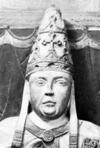- Benedict XII
-
(Jacques Fournier)died 1342, French ecclesiastic: pope 1334-42.
* * *
died April 25, 1342, Avignon, ProvencePope (1334–42).A French cardinal and theologian, he became the third pontiff to reign at Avignon (see Avignon papacy), succeeding John XXII. The bishop of Pamiers and Mirepoix and a zealous inquisitor before his elevation to the papacy, Benedict devoted himself to the reform of the church and its religious orders; he also tried unsuccessfully to prevent the outbreak of the conflict between England and France that became the Hundred Years' War. His bull Benedictus Deus (1336) set forth the doctrine of the beatific vision as a vision of God granted to the souls of the just immediately after death. Benedict XII, detail from a bust by Paolo da Siena, 1342; in the Grotto of the Vatican, RomeAlinari-Anderson/Art Resource/EB Inc.
Benedict XII, detail from a bust by Paolo da Siena, 1342; in the Grotto of the Vatican, RomeAlinari-Anderson/Art Resource/EB Inc.* * *
▪ popeoriginal name Jacques Fournierborn , Saverdun, near Toulouse, Fr.died April 25, 1342, Avignon, Provencepope from 1334 to 1342; he was the third pontiff to reign at Avignon, where he devoted himself to reform of the church and its religious orders. In the political sphere his efforts, influenced by King Philip VI of France, were generally unsuccessful. One of his most significant failures was his inability to curb the conflict between England and France, which began during his pontificate and came to be known as the Hundred Years' War (1337–1453).Entering the Cistercian order at Boulbonne and graduating as doctor of theology at Paris, he first became abbot of the French monastery of Fontfroide (1311), then bishop of the French diocese of Pamiers (1317), and bishop of Mirepoix (1326). He was made cardinal in December 1327. His distinction as a theologian and the zeal with which he opposed heretics recommended him to the cardinals in Avignon, who elected him (Dec. 20, 1334) to succeed John XXII. He worked to settle a controversy that had agitated the close of John's pontificate—the controversy over the question of the Beatific Vision, a vision of God promised to the redeemed. John had preached in several sermons that this vision would be granted only after Judgment Day. Benedict ended the dispute by issuing a bull, Benedictus Deus (1336), in which he formulated the church's teaching that the souls of the just are granted the vision immediately after death.He attempted to reform the religious orders through the imposition of stringent constitutions. These rigorous measures aroused much hostility, and most of his reforming work was undone by successors. He did not return the papacy to Rome, as the Romans, at least, had hoped he would, but he sent money for the repair of its neglected churches and for the aid of its strife-ridden populace. In Avignon he built a costly papal palace and brought in Sienese artists to decorate the local churches.* * *
Universalium. 2010.
